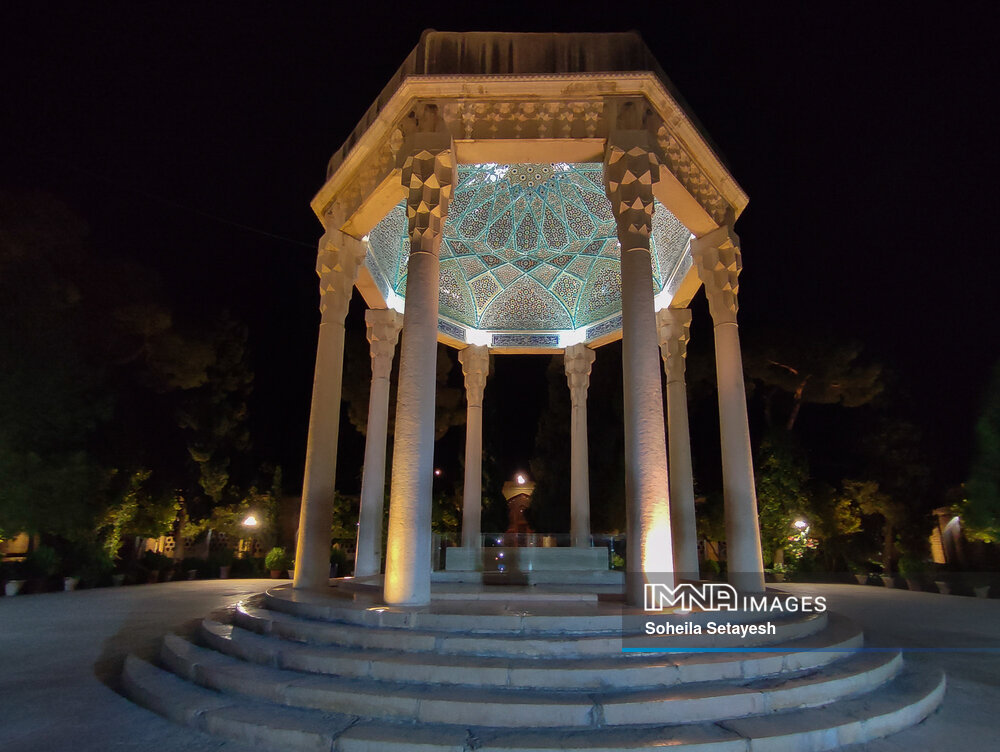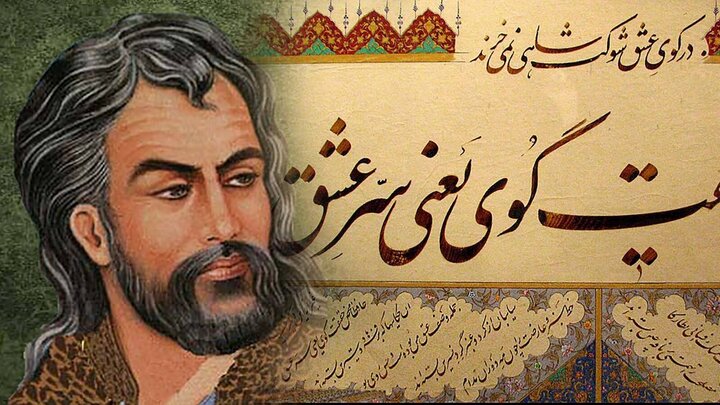Iran (IMNA) - In the heart of Iran, on a day filled with reverence and poetic fervor, the nation comes alive to celebrate the National Day of Hafiz. With great anticipation, Iranians gather to honor one of their most beloved literary figures, Khwāja Shams-ud-Dīn Muḥammad Ḥāfeẓ-e Shīrāzī, known simply as Hafiz.
The streets of Shiraz, Hafiz's birthplace, are filled with the fragrance of blooming flowers. People of all ages don traditional attire as they make their way to the renowned tomb of Hafiz, an attractive site of gathering for poets, scholars, and admirers alike.
As the sun begins to set, the atmosphere takes on a mystical aura. The sound of poetry floats through the air, mingling with the gentle breeze. Recitations of Hafiz's verses can be heard in every corner, captivating listeners and transporting them to a world of love, wisdom, and spirituality.
The celebration is not limited to Shiraz alone. Throughout the country, cultural centers, universities, and parks organize events to pay homage to Hafiz's enduring literary legacy. Poetry contests, book fairs, and symposiums are held, promoting the importance of literature and fostering a deep appreciation for Hafiz's poetry.
Iranians take this opportunity to reflect upon the profound impact Hafiz has had on their culture and identity. His words, written centuries ago, continue to resonate with people from all walks of life. They convey universal truths, exploring the complexities of human existence, the beauty of love, and the pursuit of spiritual enlightenment.
Hafiz's poetry serves as a guiding light, illuminating the path towards self-discovery and understanding. His verses are not confined to the realm of literature but serve as a source of solace, inspiration, and contemplation for Iranians throughout their lives.
On this auspicious day, Iranians come together to celebrate Hafiz's poetic genius, cherishing the way his words have shaped their collective consciousness. It is a day of unity, where the power of language transcends boundaries, connecting people from different generations and backgrounds.
The National Day of Hafez serves as a testament to the enduring power of poetry and the remarkable legacy left behind by a poet who continues to inspire and captivate hearts, not only in Iran but across the globe.

Hafiz life
Hafiz's early life is little known, but he is believed to have received a traditional education in Quranic studies and Persian poetry. His love for poetry bloomed at an early age, and his passion for words led him to become one of the most celebrated poets of his time.
Hafiz's poetry predominantly revolves around themes of love, spirituality, and mysticism. His verses are filled with profound metaphors, elegant imagery, and an enchanting rhythm that captivates readers even today. Hafiz's words have the power to transport us to another realm, where the boundaries between the physical and spiritual worlds blur.
Hafiz often expresses his deep connection with the divine in his poems and portrays love as a path to ultimate truth and enlightenment. He beautifully weaves together the themes of human emotions, nature, and the mystical journey of the soul. Hafiz's verses are not only a reflection of his own spiritual experiences but also a source of inspiration and solace for countless individuals throughout history.
Hafiz's collection of poetry, known as the Divan-e-Hafiz, consists of numerous ghazals, which are lyrical poems expressing the poet's emotions and thoughts. His works have been translated into countless languages, spreading his wisdom and beauty to people across the globe.
Influence of Hafiz on Western Literature
Hafez's profound influence extends far beyond the borders of contemporary Iran, captivating not only the hearts of the East but also inspiring poets in the distant West.
It was the eminent orientalist Joseph von Hammer Purgstall who laid the foundation for the field of oriental studies. In 1846, he translated Hafez's Diwan, a work that would ignite the creative spirit of none other than Goethe himself, leading to the birth of a collection of poems titled "The West-Eastern Divan".
Goethe, the legendary German philosopher, held Hafez in such high regard that he bestowed upon him the titles of "Saint Hafiz" and "Celestial Friend". It was in Hafez's verses that Goethe found the sublime embodiment of spirituality and asceticism, a poetic language that reached its pinnacle in the Persian poet's words, offering Goethe the profound insights and worldview he had sought throughout his life.
Inspired by Goethe's "West-Eastern Divan", a wave of German poets, including Friedrich Ruckert and August von Platen, followed suit, composing their own poems in the style of Ghazal.
Hafez's poetry, revered as the epitome of the Ghazal tradition, continues to enchant generations with its timeless beauty and lyrical prowess.
Among the German intellectuals deeply enthralled by Hafez was Friedrich Nietzsche, who frequently referenced the Persian poet in his seminal works. Nietzsche held Hafez in high esteem, considering him an ideal poet and devoting many years to the study and appreciation of his works. Hafez's name appears nearly a dozen times in Nietzsche's writings.
"Nietzsche praised Hafez for his 'blissful mockery'. To him, Hafez represented the Oriental free-spirited individual who joyfully celebrates the triumphs and tribulations of life. Nietzsche commends such an attitude as a testament to a positive and courageous embrace of life," reflects Dariush Ashouri, a prominent Iranian thinker.
In the words of Ashouri, Nietzsche discovers within Hafez a quintessential embodiment of 'Dionysian' euphoric wisdom, a profound reverence that permeates his philosophical musings.
Within a poetic tribute dedicated solely to Hafez, Nietzsche exalts the profound discernment of the Persian wordsmith and the ethereal beauty that unfolds within his verses.
In the realm of Sir William Jones, the renowned British philologist, the verses of Hafez were not mere words, but a profound contemplation on the ethereal manifestation of divine flawlessness. It was in the eighteenth century that Jones, with his erudition and linguistic finesse, unveiled to the English-speaking world the inaugural poem of Hafez, aptly titled "A Persian Song."
This poetic masterpiece played a momentous role in acquainting the denizens of the English language with the illustrious bard of Shiraz, forever altering the literary landscape.
According to the esteemed German orientalist, Annamarie Schimmel, Hafez resembles a resplendent gem adorned with an inexhaustible array of hues. His words transcend the constraints of time, transcending the boundaries of temporal and spatial existence, making him a poet for all epochs, infinitely universal.
Yet, as Schimmel elucidates, comprehending the enigmatic depths of Hafez's poetic tapestry is no facile endeavor. The poet employs a clandestine language, accessible solely to those who possess an intimate understanding of Hafez's cultural milieu. It is through this profound connection that one can truly fathom the essence of Hafez and his evocative poetry.
Even though Hafiz lived centuries ago, his poetry is relevant and timeless. His words continue to touch the hearts of readers, guiding them on a spiritual quest and reminding them of the profound mysteries of life. Hafiz's legacy as a poet, philosopher, and mystic lives on, illuminating the path for those who seek wisdom and inspiration in the world of literature.


Your Comment